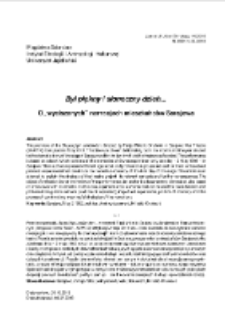- Search in all Repository
- Literature and maps
- Archeology
- Mills database
- Natural sciences
Advanced search
Advanced search
Advanced search
Advanced search
Advanced search

Object
Title: Był piękny i słoneczny dzień... O „wyciszanych” narracjach mieszkańców Sarajewa
Subtitle:
Journal of Urban Ethnology 14 (2016)
Place of publishing:
Description:
Type of object:
Abstract:
The premiere of the Bio je lijep i sunčan dan, directed by Tanja Miletić-Oručević in Sarajevo War Theatre (SARTR) took place in May 2012. This date was chosen deliberately: both the month and the year alluded to the dramatic story of the siege of Sarajevo and to the day in which the theatre was founded. The performance is based on a book which consists of the memories of townspeople from only one day – 2 May 1992 – in Sarajevo. Their authors represent different age, social and professional groups and each of them writes about personal experiences that constitute the collective memory of the first day of the siege. The article is an attempt to explain the strategy of the theatre project, its relevant contexts and further consequences. The object of reflection is not the review of the performance, but rather its documentary dimension, also based on interviews with its director. In this case, a performance is a frame that can be used for consideration and problematizing some cultural practices of expressing important experiences, politics of memory and the process of constructing meaningful strategies of the narrations
References:
Foucault M. 2000, Filozofia. Historia. Polityka. Wybór pism, tłum. D. Leszczyński, L. Rasiński, Wydawnictwo Naukowe PWN, Warszawa
Hastrup K. 1997, Przedstawianie przeszłości. Uwagi na temat mitu i historii, „Polska Sztuka Ludowa. Konteksty”, nr 1-2, s. 22-28
Kaminsky M. 1992, Myerhoff ’s „Third Voice”: Ideology and Genre in Ethnographic Narrative, “Social Text”, t. 33, s. 124-144
Kosiński D. 2010, Teatra polskie. Historie, Wydawnictwo Naukowe PWN, Warszawa
Lehmann H.-T. 2004, Teatr postradmatyczny, tłum. D. Sajewska, M. Sugiera, Księgarnia Akademicka, Kraków
Lewellen Ted C. 2010, Antropologia polityczna, tłum. A. Dąbrowska, T. Sieczkowski, Wydawnictwo Uniwersytetu Jagiellońskiego, Kraków
Markovitz F. 2010, Sarajevo: A Bosnian Kaleidoscope, Urbana, Chicago and Springfield: University of Illinois Press
Mościcki P. 2008, Polityka teatru. Eseje o sztuce angażującej, Wydawnictwo Krytyki Politycznej, Warszawa
Rancière J. 2007, Estetyka jako polityka, tłum. J. Kutyła, P. Mościcki, Wydawnictwo Krytyki Politycznej, Warszawa
Rewers E. 2008, Od miejskiego genius loci do miejskich oligopticonów, „Polska Sztuka Ludowa. Konteksty”, nr 3-4, s. 21-30
Olewicz R. 2008, Miasto w wojnie. Raport z oblężonego Sarajewa, „Polska Sztuka Ludowa. Konteksty”, nr 3-4, s. 149-19
Sikora S. 2009, Odwrócone spojrzenie albo antropologizacja antropologii, [w:] Pomieciński A., Sikora S. (red.), Zanikające granice. Antropologizacja nauki i jej dyskursów, Biblioteka Telgte, Poznań, s. 59-86
Simmel G. 1975, Socjologia, tłum. M. Łukasiewicz, Wydawnictwo Naukowe PWN, Warszawa
Vujanović A. 2002, Javni nastup i društvena uloga, „Kultura” t. 102, s. 54-62
2. maj 1992.: bio je lijep i sunčan dan..., predgovor N. M. Krešvljaković, MES, Medźunarodni teatarski i film festival Sarajevo; U.G. Videoarhiv, Sarajevo 2010
Relation:
Volume:
Start page:
End page:
Detailed Resource Type:
Format:
Resource Identifier:
oai:rcin.org.pl:61703 ; 1429-0618
Source:
click here to follow the link ; IAiE PAN, call no. P 714 ; IAiE PAN, call no. P 1505
Language:
Rights:
Terms of use:
Copyright-protected material. May be used within the limits of statutory user freedoms
Digitizing institution:
Institute of Archaeology and Ethnology of the Polish Academy of Sciences
Original in:
Library of the Institute of Archaeology and Ethnology of the Polish Academy of Sciences
Access:
Object collections:
- Digital Repository of Scientific Institutes > Partners' collections > Institute of Archeology and Ethnology PAS > Institute Publications
- Digital Repository of Scientific Institutes > Partners' collections > Institute of Archeology and Ethnology PAS > Institute Publications > Current Journals
- Digital Repository of Scientific Institutes > Literature > Journals/Articles
- Digital Repository of Scientific Institutes > Partners' collections > Institute of Archeology and Ethnology PAS > Institute Publications > Current Journals > Journal of Urban Ethnology
Last modified:
Apr 11, 2021
In our library since:
Feb 7, 2017
Number of object content downloads / hits:
555
All available object's versions:
https://rcin.org.pl./publication/81113
Show description in RDF format:
Show description in RDFa format:
Show description in OAI-PMH format:
| Edition name | Date |
|---|---|
| Sztandara, Magdalena, 2016, Był piękny i słoneczny dzień... O „wyciszanych” narracjach mieszkańców Sarajewa | Apr 11, 2021 |
Objects Similar
Ruta-Rutkowska, Krystyna
Ratajczakowa, Dobrochna
Fudakowski, Józef (1893–1969)
Kamiński, Jan Nepomucen (1777–1855) Czarnik, Bronisław (1858–1918) Zakład Narodowy im. Ossolińskich.

 INSTYTUT ARCHEOLOGII I ETNOLOGII POLSKIEJ AKADEMII NAUK
INSTYTUT ARCHEOLOGII I ETNOLOGII POLSKIEJ AKADEMII NAUK
 INSTYTUT BADAŃ LITERACKICH POLSKIEJ AKADEMII NAUK
INSTYTUT BADAŃ LITERACKICH POLSKIEJ AKADEMII NAUK
 INSTYTUT BADAWCZY LEŚNICTWA
INSTYTUT BADAWCZY LEŚNICTWA
 INSTYTUT BIOLOGII DOŚWIADCZALNEJ IM. MARCELEGO NENCKIEGO POLSKIEJ AKADEMII NAUK
INSTYTUT BIOLOGII DOŚWIADCZALNEJ IM. MARCELEGO NENCKIEGO POLSKIEJ AKADEMII NAUK
 INSTYTUT BIOLOGII SSAKÓW POLSKIEJ AKADEMII NAUK
INSTYTUT BIOLOGII SSAKÓW POLSKIEJ AKADEMII NAUK
 INSTYTUT CHEMII FIZYCZNEJ PAN
INSTYTUT CHEMII FIZYCZNEJ PAN
 INSTYTUT CHEMII ORGANICZNEJ PAN
INSTYTUT CHEMII ORGANICZNEJ PAN
 INSTYTUT FILOZOFII I SOCJOLOGII PAN
INSTYTUT FILOZOFII I SOCJOLOGII PAN
 INSTYTUT GEOGRAFII I PRZESTRZENNEGO ZAGOSPODAROWANIA PAN
INSTYTUT GEOGRAFII I PRZESTRZENNEGO ZAGOSPODAROWANIA PAN
 INSTYTUT HISTORII im. TADEUSZA MANTEUFFLA POLSKIEJ AKADEMII NAUK
INSTYTUT HISTORII im. TADEUSZA MANTEUFFLA POLSKIEJ AKADEMII NAUK
 INSTYTUT JĘZYKA POLSKIEGO POLSKIEJ AKADEMII NAUK
INSTYTUT JĘZYKA POLSKIEGO POLSKIEJ AKADEMII NAUK
 INSTYTUT MATEMATYCZNY PAN
INSTYTUT MATEMATYCZNY PAN
 INSTYTUT MEDYCYNY DOŚWIADCZALNEJ I KLINICZNEJ IM.MIROSŁAWA MOSSAKOWSKIEGO POLSKIEJ AKADEMII NAUK
INSTYTUT MEDYCYNY DOŚWIADCZALNEJ I KLINICZNEJ IM.MIROSŁAWA MOSSAKOWSKIEGO POLSKIEJ AKADEMII NAUK
 INSTYTUT PODSTAWOWYCH PROBLEMÓW TECHNIKI PAN
INSTYTUT PODSTAWOWYCH PROBLEMÓW TECHNIKI PAN
 INSTYTUT SLAWISTYKI PAN
INSTYTUT SLAWISTYKI PAN
 SIEĆ BADAWCZA ŁUKASIEWICZ - INSTYTUT TECHNOLOGII MATERIAŁÓW ELEKTRONICZNYCH
SIEĆ BADAWCZA ŁUKASIEWICZ - INSTYTUT TECHNOLOGII MATERIAŁÓW ELEKTRONICZNYCH
 MUZEUM I INSTYTUT ZOOLOGII POLSKIEJ AKADEMII NAUK
MUZEUM I INSTYTUT ZOOLOGII POLSKIEJ AKADEMII NAUK
 INSTYTUT BADAŃ SYSTEMOWYCH PAN
INSTYTUT BADAŃ SYSTEMOWYCH PAN
 INSTYTUT BOTANIKI IM. WŁADYSŁAWA SZAFERA POLSKIEJ AKADEMII NAUK
INSTYTUT BOTANIKI IM. WŁADYSŁAWA SZAFERA POLSKIEJ AKADEMII NAUK


































